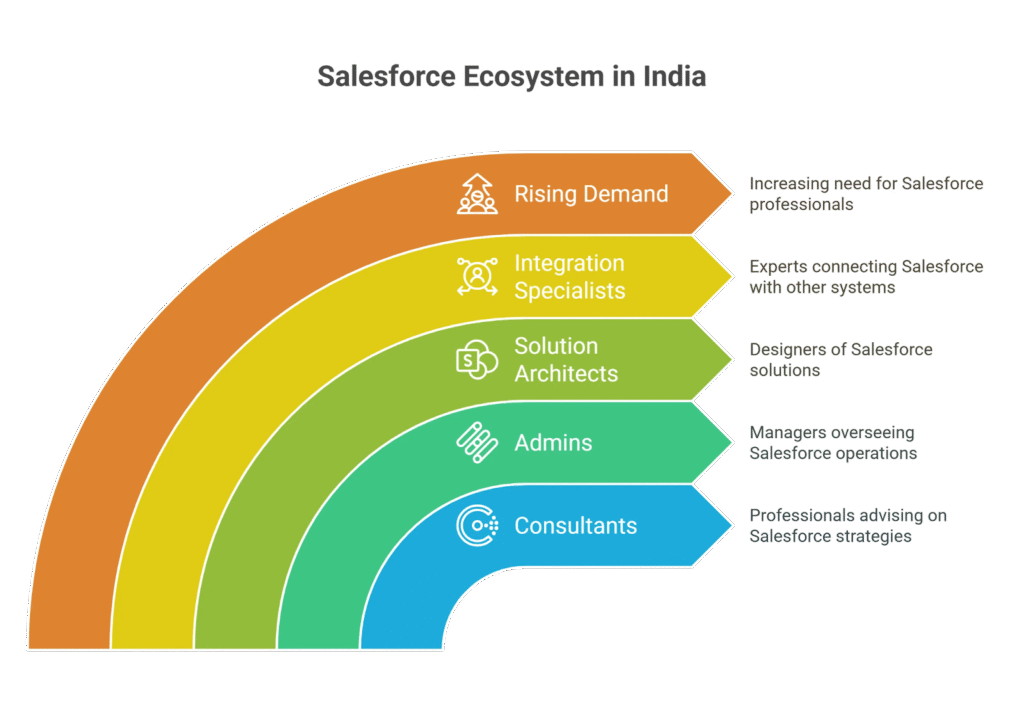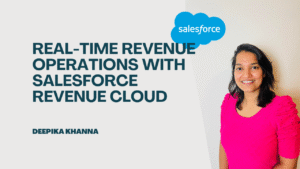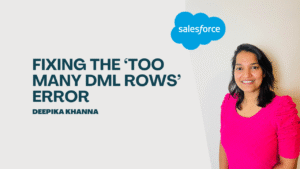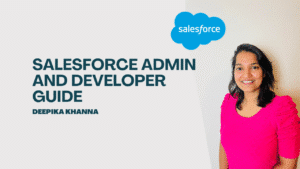Since its early days, the Salesforce community has experienced rapid growth. What started out as a small CRM service has grown into a huge cloud platform that drives marketing, sales, customer service, data analytics, integration and more and more, AI. As we look ahead to 2026, changes to the platform, better AI and lower costs for businesses are all changing which Salesforce jobs will grow and which will shrink. This blog looks at seven Salesforce Careers that will do well in 2026 and five that are likely to go away. It explains why these roles will do well or not and gives professionals advice on how to make their Salesforce jobs more secure for the future.

Table of Contents
ToggleMarket Context
It’s important to know how the market works before we list jobs. Recent industry news shows that the number of people interested in working for Salesforce has grown a lot over the past few years, while company demand has gone down. This is a sign that the ecosystem is mature and that hiring is becoming more selective. According to one study, supply grew by almost 19% while demand dropped significantly. This shows that things are getting back to normal after the years of fast growth.
At the same time, businesses are quickly implementing AI bots and automation. Both Salesforce and people who follow the ecosystem have written about how AI is being used to do both extra and replacement tasks. Leadership comments and reports show that AI-driven agent solutions have already changed the number of support staff needed and are speeding up the automation of repetitive operational tasks.

Lastly, platform providers and the admin community stress the importance of getting better at AI and automation. Many admins are looking for AI training and certifications to stay useful as low-code automation grows.
To put it simply, there is more demand for professionals who are strategic, technical, and knowledgeable about AI and less demand for jobs that are repetitive, narrowly focused and can be automated or turned into goods.
7 Salesforce roles that will prosper by 2026

1. Salesforce Architect (Solution and Technical Architect).
Why it will do well: Senior architects who can make platform blueprints are needed for complex corporate deployments, multi-cloud architectures and integrations that are more and more secure and scalable. Architects turn business strategy into technology roadmaps for multiple clouds, especially where AI agents, data pipelines and third-party services meet.
Some skills that should stand out are system design, data architecture, knowledge of MuleSoft/Integration, Salesforce architecture certifications, governance and strategies for lowering costs.
2. Salesforce AI/Automation Engineer (Agent/Einstein Specialist)
Why it will do well: As companies use agentic AI and Einstein in sales and customer service, people who know how to set up, tweak, and manage AI models in Salesforce will be in high demand. These workers connect how ML and AI work with how platforms are set up and managed.
Skills to highlight include quick coding for Salesforce, knowing how Einstein and AI products work, evaluating models, making sure data is correct, using AI in an ethical way, and working with people from other teams.
3. Integration & Data Engineer (MuleSoft, Data Cloud, ETL).
Why it will do well: These days, businesses use many different approaches, which is why they will do well. Data engineers will still be needed to make sure that integrations work well, that company data is managed well, and that real-time streaming solutions are set up. As more businesses use Salesforce Data Cloud and MuleSoft’s integration tools, they need skilled engineers who can build data models and systems that are driven by events.
Some skills that come to mind are APIs, Data Cloud, Data Modelling, Real-Time Integration, Data Governance and MuleSoft (or something similar).
4. Marketing Cloud and Customer Data Platform Specialist.
Why it will perform well: You need to know how to use Marketing Cloud, CDP, Journey Builder, and data in a careful way if you want to personalise a lot of people. Investors in digital marketing want to see a clear return on their money (ROI). Companies need professionals who can map out the paths of their customers, run ads across multiple channels, and combine identity and consent frameworks.
Some skills that should stand out are Marketing Cloud, CDP, AMPScript, SQL, campaign tracking, and privacy compliance (for example, GDPR/CCPA).
5. Business architect and product owner for Salesforce
This is why it will do well: People who can turn strategy into prioritised roadmaps, manage the demands of stakeholders, and keep track of results are the ones who will make Salesforce useful for business. Firms will need product owners who are good at business research and know how to use platforms well, as they move from project-based work to platform ownership focused on products.
Some of the skills that should stand out are partner coaching, product management, roadmapping, setting KPIs, and agile delivery.
6. Security, Privacy, and Compliance Specialist.
Why it will do well: As businesses depend more on AI and the cloud, they must ensure that data is safe and that they follow all the rules. To lower legal and reputational risk, you will need experts who know about Salesforce security design, field encryption, data residency, and AI governance.
To name a few skills, these are Salesforce Shield, encryption, access modelling, privacy frameworks, audits, and safe design.
7. Customer Success & Solutions Consultant (Result-Driven)
It will do well because companies are less likely to spend in technology just because it’s cool when the market is already good. Consultants and people who work in customer success who can show measurable business results, drive adoption, and connect the platform to metrics for revenue or cost will get the best jobs.
Adoption strategy, measuring return on investment (ROI), domain knowledge (sales, service, marketing), and change management are some skills that should stand out.
If you are striving to get a Salesforce certificate, then visit Mytutorialrack now.
Demand for Salesforce Talents by Roles
Here’s an overview of the demand for Salesforce talents in India by key roles, including job openings, projected growth by 2026, historical growth, and expected salary ranges, based on the most current market insights

| Role | Job Openings (India) | Projected Growth by 2026 | Past 5 Years Growth (2017-22) | Expected Salary (Annual, INR) |
| Salesforce Architect (Solution & Technical Architect) | 10,000+ | 43–44% | 111% | 29–46 lakh (avg. ~32 lakh) |
| Salesforce AI/Automation Engineer (Agent/Einstein Specialist) | 6,000+ | 48–50% | 170% | 18–40 lakh (avg. ~23 lakh) |
| Integration & Data Engineer (MuleSoft, Data Cloud, ETL) | 7,000+ | 38–41% | 145% | 12–28 lakh (avg. ~16 lakh) |
| Marketing Cloud & Customer Data Platform Specialist | 5,000+ | 34–37% | 121% | 10–25 lakh (avg. ~14 lakh) |
| Business Architect & Product Owner for Salesforce | 3,500+ | 28–31% | 120% | 16–50 lakh (avg. ~21 lakh) |
| Security, Privacy, and Compliance Specialist | 3,000+ | 40–42% | 118% | 11–32 lakh (avg. ~15 lakh) |
| Customer Success & Solutions Consultant (Result-Driven) | 8,000+ | 32–34% | 122% | 9–22 lakh (avg. ~13 lakh) |
5 Salesforce roles that will fade by 2026
1. Entry-level Salesforce Admin (no AI or integration abilities)
The reason it will fade: AI and low-code tools are increasingly taking over simple, repetitive admin jobs like making reports, simple workflows, and field updates. If entry-level administrators don’t learn more about integration, AI automation, security, or product ownership, they may find it harder to find full-time jobs and more short-term, standard work. Upskilling is still the answer.
2. Tier-1 Support or Helpdesk Case handling was the main focus of the roles.
Because agentic AI and advanced routing automation have already cut down on the amount of support needed in some companies, and AI bots now handle a lot of routine support requests. If you don’t add higher-value tasks to roles that are just triage or repetitive, they can become exposed.
3. Specialists in Declarative Customisation (Form/Field builders)
The reason it will fade: As templates, AppExchange packages, and low-code automation become more popular, the need for experts whose only job is to set up things without thinking about how they work together decreases. People who can integrate, protect, and improve whole processes will do better in the market.
4. Legacy On-Prem Integration and Batch ETL Specialists
The reason it will fade: Instead of batch ETL and on-premise middleware, real-time APIs, event streaming, and cloud-native integration methods are being used. Experts who are stuck in old ways of doing things need to learn how to use APIs, streaming, and cloud data fabrics.
5. Narrow-Scope Reporting and Dashboard Developers.
The need for experts who only build dashboards is going away because of AI-driven report generation, embedded analytics, and enhanced insights. Analysts who can combine subject intuition, data engineering, and telling stories that make sense will be in high demand in the future.
Hiring patterns and compensation signals
The above-mentioned high-value and rare skills will be at the centre of hiring and pay. According to new salary and market reports, roles with a lot of technical knowledge (like architects, integration engineers, and product owners) and specialised experts are still getting paid more, while roles like admin and support are becoming less valuable. In their resumes, job seekers should list both technical proof points (like migrations, connections, and AI projects) and business impacts that can be measured.

Conclusion
In 2026, strategy breadth and technical depth will be valued at Salesforce. If you are just starting out in your job, focus on becoming fluent in the basics of one platform and one speciality, such as integration, AI, security, or marketing automation. People in the middle of their careers should switch to jobs that combine technical leadership with product thinking. Businesses will always need people who can create AI processes that are safe and easy to understand, make sure that platform investments lead to measurable business results, and connect Salesforce to complicated enterprise ecosystems.
Bottom Line
Platforms like Mytutorialrack, run by Salesforce trainer Deepika Khanna, offer structured courses, real-world projects, and mentorship to help professionals master Salesforce solutions, such as Salesforce Development, and stand out as experts making a difference in the changing CRM landscape.






